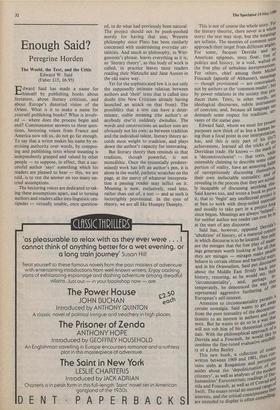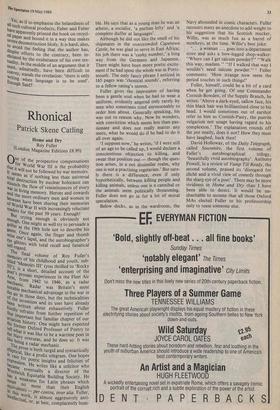Enough Said?
Peregrine Horden
The World, the Text, and the Critic Edward W. Said (Faber £15, £6.95)
Edward Said has made a name for himself by publishing books about literature, about literary criticism, and about Europe's distorted vision of the Orient. What is it to make a name for yourself publishing books? What is involv- ed — where does the process begin and end? Commonsense answers to these ques- tions, hectoring voices from France and America now tell us, do not go far enough. To say that a writer makes his name by ex- ercising authority over words, by compos- ing and publishing texts whose meaning is independently grasped and valued by other people — to suppose, in effect, that a suc- cessful author 'says' something which his readers are pleased to hear — this, we are told, is to rest the answer on too many un- tried assumptions.
The hectoring voices are dedicated to tak- ing these assumptions apart, and to turning authors and readers alike into linguistic cen- tipedes — virtually unable, once question-
ed, to do what had previously been natural. The project should not be pooh-poohed merely for having that aim; Western philosophy since Plato has been similarly concerned with undermining everyday cer- tainties. And much as philosophy, in Witt- genstein's phrase, leaves everything as it is, so 'literary theory', as this body of work is called, in practice leaves most readers reading their Nietzsche and Jane Austen in the old naive way.
Yet for the sophisticated few it is not only the supposedly intimate relation between authors and 'their' texts that is called into doubt (the New Criticism already having launched an attack on that front). The possibility that a text can have a deter- minate, stable meaning (the author's or anybody else's) suddenly dwindles. The words and constructions an author uses are obviously not his own: as between tradition and the individual talent, literary theory ac- cords most weight to tradition, and plays down the author's capacity for innovating.
But literary theory then reminds us that tradition, though powerful, is not monolithic. Once the (essentially predeter- mined) work has left an author's pen, it is alone in the world, pathetic scratches on the page, at the mercy of whatever interpreta- tion a passing reader may inflict on it. Meaning is now, exclusively, read into, rather than out of, a text — and as such is incorrigibly provisional. In the eyes of theory, we are all like Humpty Dumpty.
This is not of course the whole story. For the literary theorist, there never is a whole story; the text may stop, but the meanings are infinite. The enemies of common sense approach their target from different angles' For some, Jacques Derrida and It American epigones, texts float, free 01 politics and history, in a void, wafted on the free play of nebulous interpretations. For others, chief among them Michel Foucault (apostle of Althusser), meanings — though provisional — are constrained, not by authors or the 'common reader', but by power relations in the society that Pro- duces them. Texts, in other words, are ideological discourses, subtle instruments of coercion; and, because all language Use demands some respect for tradition, ser- vants of the status quo.
Edward Said, whom we must for
-resent F purposes now think of as less a human be- ing than a focal point in our interpretation,' has, and this is only part of his fits') ,achievement, learned all the tricks of dit. Derridean trade. He knows — them arIe a `deconstructionist' — that texts, While a claiming to describe some ha portion of reality, have an annoying Ilab i of surreptitiously discussing themselvesi their own ineluctable textuality; an revealing in the process that they area cw,-; ly incapable of discussing anything else. ly knows too, and wrote a book Prays it, that to 'begin' any intellectual project; at best to work with shop-soiled mater g and usually to take part in a project ic'eS'" since begun. Meanings are always 'belat for neither author nor reader can ever bel at the art f any scourse. Saidst has,o howeve dir,opposed Derr' 'da's `abolition' of history, of a material conrile7;, in which discourse is to be located. Not an °an. are the mirages that the free play of ITI„ that ings generates worth looking at for t they are mirages — mirages make ,P,e„°23,,,s; behave in certain obtuse and harmful ways; aabnoduitn thhies OmriiedndtiaelisEma,stSafiirdmPinyt back heir history, d,g, as ahnewould saY, perhaps they temperately, he denounced the waY, the represented aggressive furthering 01
European's self-interest. its a perrn
itnenntioosntatlog circumstantiality certain ia. Said wants to get atwrej, from the pure textuality of the deconstor tionists to an interest in authors and that texts. But he wants to do so in a waY will not rob him of his theoretical creutlf a tials. With the philosophical apProach.,,„ to Derrida and a Foucault, he would 11,'"_ih_ tcyomo fbiane john fine-tuned evaluative sensw of essaYs This new book, a collection tues n ° etoun; written between 1969 and 1981,
ort
tains stabs at Reaganism and p the asides about the `depoliticisation oolderp citizenry', as well as analyses of them , per, humanities' Eurocentrism; readings °1,, rida and Foucault, as well as of Conrad and Swift. The essays reveal an unusual rangebevy interests, and the critical consciousnes. are intended to display is often comPet' Yet, as if to emphasise the belatedness of all such cultural products, Faber and Faber have apparently printed the book on recycl- ed paper and bound it in a way that makes severe deconstruction likely. It is hard, also, to avoid the feeling that the author has, despite efforts to the contrary, been in- ebriated by the exuberance of his own tex- tuality. In the middle of an argument that it Must, admittedly, have been difficult to Convey, stands the revelation: 'there is only writing when language is to be used'. Enough Said?















































 Previous page
Previous page